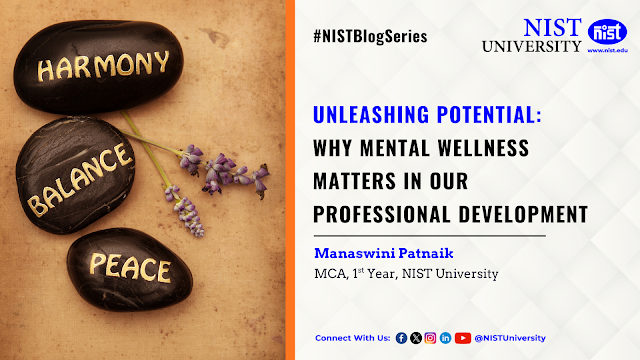TOWARDS A SUSTAINABLE FUTURE- ROLE OF ETHICS IN WORKPLACE CULTURE
Work ethics, as defined
by the Merriam-Webster Dictionary, refers to "a belief in work as a moral
good, a set of values centered on the importance of doing work, and reflected
especially in a desire or determination to work hard." In India, this
concept has deep roots, with the belief that "Work is Worship"
spanning thousands of years. It suggests that both spiritual and moral goals
can be achieved through sincere and meaningful work, independent of religious
debate. In our culture, it is believed that one can connect with the divine
through their work.
Ethical questions about
work and life have often been explored through philosophy and religion. Many
principles from these traditions offer valuable insights into the ethics of
work life, including values like right thought, right action, right speech, and
right effort. Additionally, honesty, fairness, kindness, and selfless
service-without expecting anything in return-are central moral teachings that
guide us in our work and daily lives.
A critical ethical
question that often arises is whether the ends justify the means. Mahatma
Gandhi, a pioneer in ethical thinking, argued that unethical or unjust means
cannot be justified, even in the pursuit of a noble goal. According to Gandhi,
unethical actions may provide short-term success, but they ultimately undermine
the very purpose of the work. For a goal to be truly ethical, both the ends and
the means must align with principles of justice and morality.
In any workplace, certain
core values and principles must guide our actions. These include diligence,
dedication, discipline, cooperation, clarity in thinking, cleanliness, and
conscientiousness. Other important values include gender sensitivity, honesty,
integrity, professionalism, and a positive attitude. A workplace that values
productivity, punctuality, respect for diversity, reliability, and
responsibility fosters an environment of growth and collaboration. Rationality,
scientific thinking, and effective time management are also essential in
achieving both individual and organizational success.
The Role of Leadership in
Shaping Ethical Workplace Culture:
Leadership plays a
pivotal role in cultivating an ethical workplace culture. Ethical leadership
isn't just about setting high standards or making good decisions-it's about
modeling those standards and embedding them into the organizational fabric.
Leaders set the tone for how ethical principles are valued and practiced within
a team or company. Their actions, decisions, and even the way they communicate
can deeply influence the ethical climate of the workplace.
Leaders must be role
models, showing integrity, transparency, and fairness in every aspect of their
work. When leaders prioritize ethics, it sends a clear message that values like
honesty, respect, and responsibility are non-negotiable. Furthermore, ethical
leadership encourages open communication, where employees feel safe to voice
concerns, ask questions, and raise issues of ethics without fear of
retaliation.
One key aspect of ethical
leadership is fostering a culture of accountability. Leaders who hold
themselves accountable for their actions-both successes and failures-create an
environment where employees are more likely to follow suit. In organizations with
strong ethical leadership, there's a shared commitment to doing the right
thing, even when it’s difficult or unpopular.
Leadership also plays a
critical role in decision-making, particularly when tough choices arise.
Ethical leaders make decisions with integrity, taking into account both the
short-term and long-term consequences, and ensuring that their choices align
with the values and mission of the organization. This often requires leaders to
consider the impact of their decisions not only on the company’s bottom line
but also on employees, customers, and the broader community.
The Dynamic Nature of
Work Ethics:
Work ethics is not a
static concept; it evolves with changes in society, economy, politics, and
technology. While the core principles may remain constant, these external
factors greatly influence how work ethics are applied in the modern world. For
instance, society has shifted from an agrarian-based economy to one dominated
by industrialization and globalization. This shift has transformed people's
lifestyles, leading to the decline of traditional joint family structures and
the rise of urban, fast-paced environments. Additionally, the way we receive
information has drastically changed newspapers are no longer the primary source
of news. Digital media, social platforms, e-newspapers, television, and radio
have taken center stage.
As these shifts continue,
it’s important to reflect on how ethical values in the workplace must adapt to
these changes while remaining grounded in timeless principles of right action,
fairness, and integrity. In an era of rapid technological advancement, ethical
issues such as data privacy, cybersecurity, and AI ethics are becoming
increasingly important. Organizations must not only comply with legal and
regulatory standards but also align with higher moral standards to build trust
and maintain their reputation.
Conclusion:
Sustainability is a buzz word today. Every action we do must be oriented towards sustainability. Humankind today is confronted with challenges of multiple wars, exploitation of natural resources and insensibility for fellow beings. A sustainable future demands that we behave ethically- by cultivating a culture of responsibility, respect, and fairness. By prioritizing ethical behaviour, we contribute not only to the success of our organizations but to the creation of a more just and sustainable society. In this endeavor, leaders play a crucial role, not only in upholding these values but in inspiring others to do the same. Through their actions and decisions, leaders have the power to shape the ethical landscape of the workplace, ensuring that the pursuit of success is always guided by principles that reflect integrity and justice.




Comments
Post a Comment